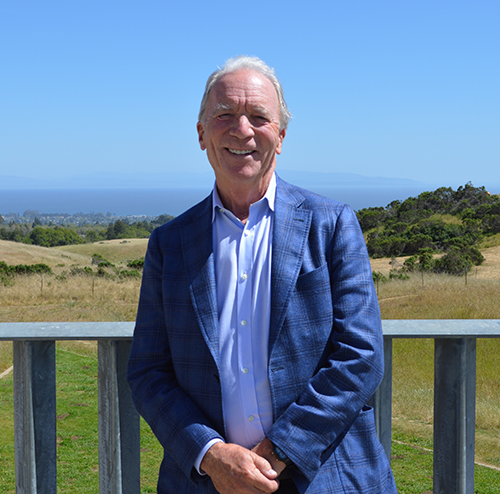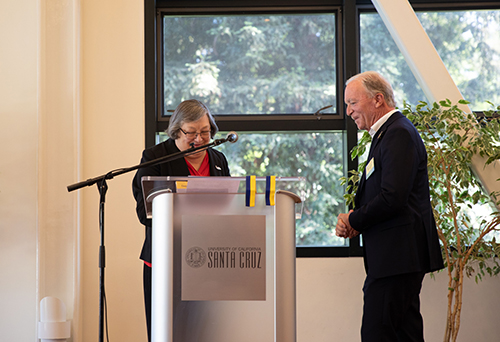Campus News
UCSC alum creates transformational opportunities in the Arts
Best known for producing the U.S.’s longest running daytime soap opera, “Days of Our Lives,” UCSC alumnus Ken Corday is a nine-time daytime Emmy nominated producer. Corday has ushered in new opportunities for the film department at UCSC, and has now expanded his generosity to the music department.



Ken Corday (Porter ’75, Aesthetic Arts)—UC Santa Cruz alumnus, award-winning television producer, and film industry trailblazer—is a stark advocate and supporter of the arts both on and offset. Best known for producing the U.S.’s longest-running daytime soap opera, “Days of Our Lives,” Corday is a nine-time daytime Emmy nominated producer and has a star on the Hollywood Walk of Fame.
With intent to make a lasting impact on UC Santa Cruz’s music department and students, Corday established The Kenneth R. Corday Family Chair in Music for Film, Television, Emerging Media, and Multimedia Collaboration in late June. This generous and transformational gift will be used to provide the appointed chair holder a scholarly allowance to support teaching, research, and service in music for film, television, and media.
Corday graduated from UC Santa Cruz with a Bachelor of Arts in Music/Aesthetic Studies in 1975 and a Master’s degree in Music Composition from San Jose State University (SJSU) in 1977. He said that his music education at UCSC was instrumental for his work as a television producer, and wants to uplift current students pursuing similar careers.
“Once you’ve achieved a certain level of proficiency and professionalism in the world and have had the wherewithal to be charitable, your first look should be to the people that got you where you’re going or where you are,” Corday said. “I wouldn’t be where I am today had I not gone to UC Santa Cruz and had not gone on to graduate school. So it’s time for me to give back.”
Establishing the Corday Family Chair in Music is not the first time Corday has chosen to support the Arts at UCSC.
In 2015, Corday established the Kenneth R. Corday Family Presidential Chair in Writing for Television and Film dedicated to theater and new media arts education at UCSC. In celebration of the Corday Family Chair in Writing for Television and Film, Corday returned to UCSC on May 20 to attend an investiture ceremony which announced Yiman Wang as the incoming chairholder, celebrated outgoing chairholder Rick Prelinger, and honored the generosity and legacy of Ken Corday.
The Corday family’s transformative gift has helped fund multiple film classes at UCSC, such as Professional Topics in Film, Writing about Film, Television & Media, and Understanding Media.
In addition, the Arts Division looks forward to Corday-funded projects that will drop this year: a series of lectures in memory of late arts professor Jonathan Kahana, visits by emerging Native American writers and producers, planning and development of a granting program for very recent alums, and curricular innovation.
Dean of the Division of the Arts, Celine Parreñas Shimizu, expressed excitement and gratitude for Corday’s long-standing support of the Arts at UCSC.
“The Kenneth R. Corday Family Presidential Chair in Writing for Television and Film will benefit forever generations of UCSC faculty and students forever with vital resources to tell new, inclusive, stories that transform our society,” Parreñas Shimizu said. “And with the announcement of yet another endowed chair, this time in Music, the Arts has another opportunity to honorably shepherd Mr. Corday and his family’s legacy at UCSC, his beloved alma mater. When the giver emanates the happiness that comes from giving, we behold the resulting joy in our community.”
Outgoing Corday Family Chair in Writing for Television and Film, Rick Prelinger, emphasized the impacts the Corday Family funds have had on the film department and the programs made available to students as a result of Corday’s gift.
“Corday Family funds have helped Film and Digital Media create many new opportunities for students,” Prelinger said. “We’ve brought film and television writers, producers, directors, and artists into classes to share their ideas, skills, and careers with students. We’ve increased the number of writing classes we offer. We’re creating opportunities for our graduate students to write and publish. We’re working on evolving our curriculum to better serve students as they prepare to enter the rapidly evolving media industries. And we look forward to doing much more.”
Prelinger added that his research has dramatically benefited from the Corday family’s generosity, utilizing Corday research funds for archival film scanning and editing for his recent film “Earth, Fire, Air, Water: California Infrastructures.”
Corday, a longtime leader in television drama, is dedicated to preparing students for the industry and wants to do so through UC Santa Cruz.
“There’s so much competition in the TV and film business, and there’s not a propensity to train young writers and producers in film and television,” Corday said. “So I wanted to establish the [Corday] Chair to develop talent here for the industry. How do we prepare students for what we call ‘the jump’—jumping out of college and into the professional world. It’s daunting, and it’s the reason why I established the Chair.”
Ken Corday at UCSC
Corday attended UC Santa Cruz in its early years, with a population of under 2,500 students and a music department in its infancy. Upon visiting UCSC almost five decades after graduating, Corday said the campus looked like an entirely different university.
“It’s mind-blowing because none of this was here 50 years ago,” Corday said. “It’s so satisfying, wonderful, and inspiring to see what’s happened with music here and with the music buildings. I think the student body is extremely fortunate. Not only to have this paradise to live and study on but the great facility that it has become.”
As a student, Corday took jazz, music composition, and songwriting classes with music professor and UCSC alumnus Randy Masters both at UCSC and at SJSU. Masters said that Corday was one of his most accomplished and gifted students.
“Ken was just a wonderful student completely, and he was just a gem to work with,” Masters said. “He was very talented, and I knew he was on a professional path by the different things that he did. Even as a student, he had that laid out ahead of him; he was on that path.”
Corday’s advice to current film and music students at UC Santa Cruz? “Be fearless.”
“It’s easy to say it sounds altruistic, but be fearless,” he said. “Don’t second guess yourself, ever. Don’t let someone else tell you how to do it—do it your way. Keep knocking on the door, and if you have to knock 999 times, that’s okay. Because maybe on the 1,000th time, the door will open, and when that door opens, go through it prepared with full confidence that you’re going to do what no one’s done before.”
Days of Our Lives
The first episode of “Days of Our Lives” aired on NBC on Nov. 8, 1965, under the direction of Ken Corday’s parents, Ted and Betty Corday. The show quickly became a household hit following the usual soap opera threads of love, marriage, divorce, and family life. By 1975, the series was so successful the 30-minute episodes were expanded to 60 minutes.
Over 14,000 episodes later, “Days of Our Lives” is the longest-running daytime soap opera in the United States.
“Days of Our Lives will be 58 this November, and I think 60 is very possible,” Corday said. “I’m very proud to have been able to carry on the legacy that my father created when he created the show, and then my mother, extremely strong-willed and farsighted, took it and made it a hit.”
When his father passed, Corday’s mother ran “Days of Our Lives” as a single woman and quickly became a Hollywood leader and trailblazer. Corday said “Days of Our Lives” is his family’s legacy.
The television drama still airs on NBC and was recently renewed for two more seasons, extending the series to 2023. Corday hopes he will be able to continue a legacy of social transformation through the show and push the boundaries of daytime television.
“At UCSC we know that we have not yet unleashed the power of art until all are uplifted, enabled and supported,” Dean of the Division of Arts Celine Parreñas Shimizu said. “To engage the pain and suffering inflicted by institutions is an act of resistance undertaken so as to transform these institutions—whether of media or education. This is what Days of Our Lives does, and what we do here in the Arts at UC Santa Cruz. And this is why Ken Corday represents the best of us!”